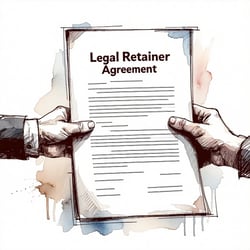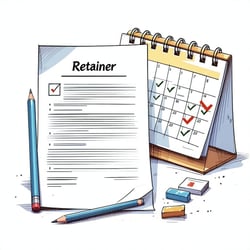.webp)
Understanding Legal Retainer Agreements in Practice
Companies employing trust-based retainers have 85% collection rates, as opposed to only 70% for non-users.
Source: Future Proof Accounting
A retainer agreement is much more than a transaction.
For many, a legal retainer agreement is merely another bureaucratic step, a fee to be paid before work commences.
It's a contract, a roadmap, and perhaps, the one most critical document in establishing a successful legal relationship.
Why Retainer Agreements are Your Legal Safety Net?
A well-written retainer agreement establishes the foundation from day one. 
It specifies how the relationship will work, explains the services, defines how fees are calculated, and spells out what occurs when the retainer expires.
It eliminates assumptions and substitutes them with clarity.
Here we'll take you through everything legal retainer agreements need you to know, from the different types and what they can do for you, through what constitutes a good agreement (and how to avoid pitfalls).
Key Takeaways
- A legal retainer agreement is a cornerstone contract that sets out the client-attorney working relationship.
- It details the scope of work, terms of payment, duties, and termination clauses, removing ambiguity at the outset.
- There are several forms of retainers - general, special, security, evergreen, and hybrid, each for varying legal requirements.
- Well-framed agreements minimize billing conflicts, increase client satisfaction, and reduce law firm inefficiencies.
- Clients ought to look out for red flags: ambiguous fees, vague scope, or concealed clauses.
- Technology, such as practice management software and AI, now facilitates better retainer tracking, invoicing, and compliance.
- The proper retainer agreement preserves rights, saves time, and creates trust for both parties.
What is a Legal Retainer Agreement?
Fundamentally, a legal retainer arrangement is a signed contract between a client and a law firm or attorney, with defined stipulations as to how services shall be provided, what they will cost, and what both parties are committed to.
It would normally include:
- The extent of legal services (what your attorney will and will not do),
- The rate system (hourly, flat, contingency, or combination).
- Payment terms, such as whether an initial deposit is required,
- How long the contract shall last,
- And under what circumstances either side can opt-out if necessary.
A legal retainer agreement is not a one-size-fits-all document.
It’s highly customizable based on the nature of the relationship.
Whether you’re engaging a lawyer for a one-off task (like reviewing a lease) or for long-term counsel (like managing all legal needs of a growing business), the agreement acts as the blueprint of expectations.
A retainer agreement does the same for your legal process, it sets the boundaries prior to taking action.
And that subtlety is important. For example, a lot of people get a retainer confused with a retainer fee.
The retainer fee is the advance payment (which may or may not be refundable, depending on the contract).
But the retainer agreement is the detailed document that sets out the whole working arrangement.
Without it, both sides are acting on assumptions, and assumptions are costly in law.
Benefits of a Legal Retainer Agreement
For Clients 
One of the greatest fears clients have when hiring legal services?
Expenses. A retainer agreement removes that fear by defining precisely how and when payments will be issued, what is covered in the scope of work, and how and when any overage charges will be addressed.
This transparency allows clients to budget and avoids unwanted billing surprises.
Moreover, many retainer agreements guarantee access to legal services.
That means you’re not competing with 15 other clients for attention every time something urgent pops up, your legal partner is already committed to supporting you.
For Lawyers
Lawyers are not merely handling legal matters, they're handling a business.
Retainer agreements provide a steady stream of income, enhancing cash flow and relieving budgetary strain.
They also save time spent tracking down invoices, particularly when retainer funds are deposited in trust accounts or in the form of evergreen retainers.
From a service delivery perspective, it enables lawyers to manage resources better.
When expectations are defined in advance, attorneys can concentrate on performing their best work instead of answering questions about billing time or scope creep.
Types of Legal Retainer Agreements
All legal retainer agreements aren't equal. They're more of a spectrum, actually.
They range from brief, transactional engagement to ongoing legal partnerships.
Depending on the nature of the legal issue, your budgeting strategy, and how frequently you expect to need legal assistance, you'll choose one.
General Retainer
Consider this your lawyer "on call." A general retainer is paid to guarantee a lawyer's availability for some period of time.
It doesn't always indicate that the attorney will do work right away, it simply ensures they will be on call when needed.
This is typical in corporate practice or with upper-level executives who can require frequent legal advice but not necessarily on a day-to-day basis.
Special Retainer
This is for a single job. You hire a lawyer to work on a specific case such as dealing with a divorce, trademark registration, or writing a commercial lease.
When the job is done, the contract expires.
Security Retainer (a.k.a. Retaining Fee)
This is the most common model: the client pays a fee in advance, which is put into trust.
The lawyer then invoices against that sum as the work is done.
Unused money is refunded. This setup ensures the lawyer is paid while guarding against overcharging the client.
Advance Payment Retainer
This is less prevalent and can be problematic.
In this model, the client pays in advance for legal services, and the fee becomes the property of the lawyer the moment it is paid, although the services may not have been performed yet.
This practice is limited or prohibited in some jurisdictions because of refund issues.
Evergreen Retainer
This is a type of security retainer. The client promises to have a minimum balance in the trust account.
When the money falls below a certain level, the client makes up for it. It's best for long-term legal requirements.
Red Flags & Green Lights
![]() A well-written legal retainer agreement can be your safety net, as long as it's written with transparency and mutual understanding.
A well-written legal retainer agreement can be your safety net, as long as it's written with transparency and mutual understanding.
Too bad not all agreements are leakproof. Some have ambiguous terms or even skewed provisions that can convert a promising legal relationship into a headache disaster.
When to Slow Down and Reconsider
-
Ambiguous Scope of Services
If the agreement doesn’t clearly outline what services are covered or worse, leaves it open-ended, it’s a recipe for misunderstanding. Ambiguity benefits no one.
-
Unclear or One-Sided Billing Terms
Watch out for agreements that mention fees without breaking down when or how they’ll be charged. Is there a trust account? Are there replenishment rules? No one wants surprise invoices.
-
Excessive or Unjustified Upfront Fees
A large retainer with no clue as to where the money is going or no refund clause should alert. Retainers must be in line with work.
-
No Termination Clause
If there is no obvious means of either party wanting to leave the contract, then that's a problem. Every party needs an exit strategy.
-
Automatic Renewal Without Notice
A deal that extends ad infinitum with no notice or renewal period can ensnare customers into repeated commitments without examination.
-
No Refund Policy
There must always be transparency regarding what is done with unused retainer money. A "no refunds under any circumstances" proviso is not only unpleasant; it's also a possible ethical problem.
When a Retainer Agreement Serves Everyone Well
-
Repeated Legal Needs
If you’re a business needing frequent legal advice, whether it’s contract reviews, compliance, or negotiations, a legal retainer agreement provides consistent, predictable support.
-
Long-Term Relationship Building
Great for clients and firms alike; retainer agreements foster continuity. The attorney becomes deeply familiar with your needs and can offer tailored advice without a steep learning curve every time.
-
Complex or Unpredictable Cases
In disputes, mergers, or IP issues, scope and duration can change. Flexible retainer structure ensures coordination of changing needs and avoids opacity on costs.
-
Clear Terms and Mutual Trust
If the contract is like a two-way street with defined obligations, reasonable fees, and space for communication, it's a good basis for successful collaboration.
Final Thoughts
A retainer agreement that is well-designed and backed by technology is more than a monetary transaction; it's a promise.
Law firms today are adopting systems that notify both sides when the balance falls below, automatically monitor billable hours, and offer one-click approvals of invoices.
Microsoft 365 is such a robust ecosystem.
Built natively on Microsoft 365, Dock 365's contract lifecycle management (CLM) platform simplifies how you draft, monitor, and manage legal retainer agreements from start to finish.
From automated document workflows and secure client portals to AI-driven contract summaries and trust account integration, Dock 365 transforms a static agreement into a living component of your legal operations.
It also provides a central system of record for handling other critical documents, such as a business transfer agreement outlining the sale and transition of business ownership, ensuring legal consistency across your organization.
Schedule a free demo and learn how Dock 365 can streamline and fortify your retainer agreement process.
Like our content? Subscribe to our newsletter on LinkedIn for more insights and updates.
Book a Live demo
Schedule a live demo of Dock 365's Contract Management Software instantly.

Written by Jithin Prem


